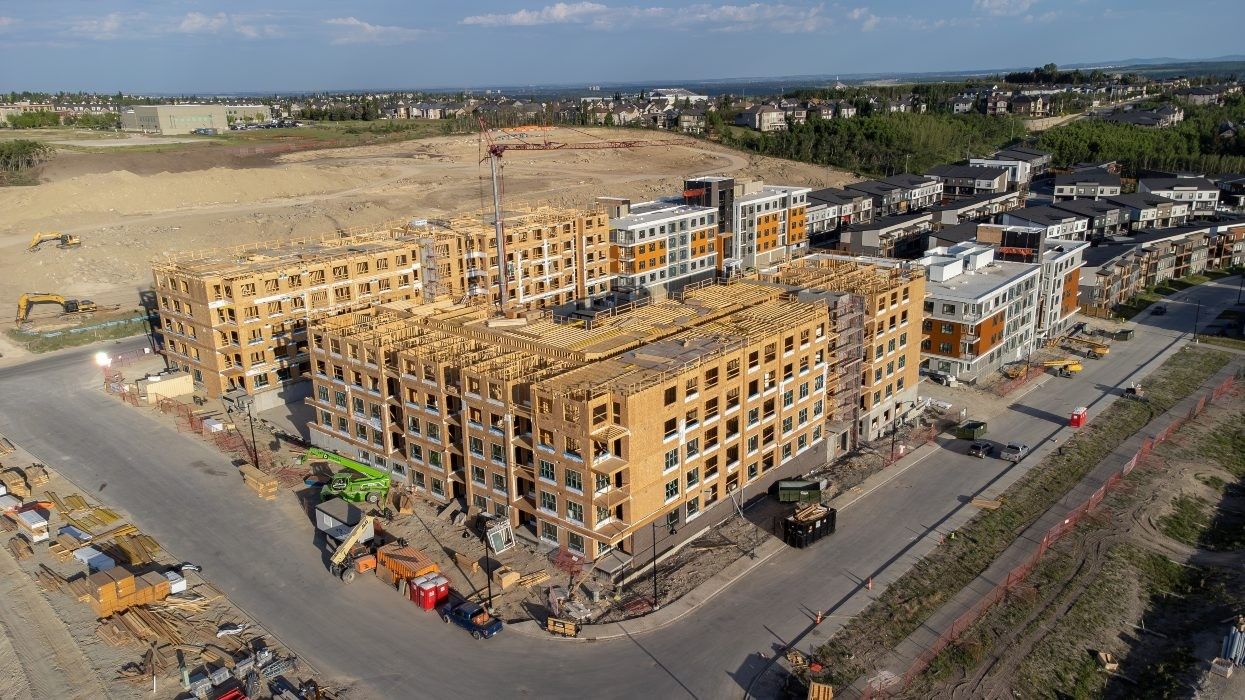After a marathon public hearing, the City of Calgary approved its "Home Is Here" housing strategy on Saturday, September 16, 2023, setting the groundwork for a comprehensive suite of actions to address the housing affordability crisis amidst Alberta's population boom.
"The Strategy is enabling accelerated and deliberate action to unlock resources," said the City in an annual progress report that's set to be received by Council today. "These actions have resulted in short-term changes to housing supply and will influence long-term changes to housing affordability. The actions demonstrate The City's commitment to ensuring Calgary's reputation as a world-class city where everyone has an affordable place to call home."
"Strategy implementation is a cross-corporate endeavour," the City added. "Additionally, Administration is leveraging The City's wholly-owned subsidiaries (Calgary Housing, Attainable Homes Calgary, and Calgary Municipal Land Corporation) to advance actions under the Strategy. The collective actions to improve housing affordability for Calgarians are making a difference as we continue to work to close the housing supply gap."
By the numbers, Calgary is making impressive progress.
In 2024, the City advanced over 25,000 new market housing units to the building permit stage, a significant improvement over the annual average of 14,000 units. Non-market homes also saw a boost, with 893 new units reaching the development permit stage by the end of 2024, a 850% increase from 2023.
Although the latter still falls short of the target of 3,000 units per year that's outlined in the Home Is Here housing strategy, the City underscores that it has reached nearly 95% of its three-year Housing Accelerator Fund target — within the first year, no less. As a result, Calgary was one of 27 municipalities to receive Housing Accelerator Fund bonuses earlier this year.
Aside from pure supply, the range of housing choices has also improved, with townhomes, rowhouses, and similar housing forms making up 43% (966 units) of all low-density development permit applications in 2024, up from just 28% in 2023. A press release published by the City earlier this month also noted that 5,000 new secondary suites were registered in 2024, up from less than 3,000 in 2023.
Overall, Calgary recorded the highest housing starts per capita in Canada in 2024 with 20,165 units. More recently, it also led all Canadian municipalities in housing starts in Q1 2025 and accounted for 55% of all housing starts in Alberta.
In addition to the aforementioned statistics, the City has made progress on several of its housing-related initiatives:
- A permanent Chief Housing Officer [Reid Hendry] was recruited and onboarded to steward The City’s corporate-wide action on housing and leverage funding and partnerships to increase supply and support the housing sector.
- Council approved the Non-Market Housing Property Tax Exemption Bylaw, allowing non-profit housing providers to provide the lowest possible rents.
- Five City-owned surplus sites were awarded through Non-Market Land Sale #4.
- Onward Homes has been chosen as the official housing developer for the Franklin Station Area Improvements. This project will bring new housing opportunities, sustainable growth, and better transit access to the community.The project is expected to create up to 378 homes, half of which will be non-market.
- The HomeSpace Family Housing project in Whitehorn is under construction to provide non-market housing for 52 families with children who are at risk of or are experiencing homelessness.
- Seven non-profit housing projects were awarded $30.7 million through the first round of the Housing Capital Initiative, expected to create 480 homes.
- Five office building conversions expected to open this year creating about 680 new homes downtown in 2025.
The Current State Of Affairs
While the City is making significant progress, it recognizes that housing pressures continue to exist in Calgary. It continues to lead the country in population growth and that the gap between the number of units coming online and the numbers of units needed is increasing, not decreasing, particularly for non-market housing, according to the City. Furthermore, it says housing prices "are at an all-time high" and average market rents remain high.
For developers, inflation has decreased, but tariffs and geopolitical unrest are expected to increase the costs to build housing and thus the cost of living.
"While significant strides have been made since the Strategy was approved, there is more work to do to realize its outcomes," said the City. "We are pulling on all levers and will continue to do more and do it faster, specifically in the areas of investment, advocacy and regulation."
Work that the City will continue to do include further streamlining planning processes to make them more development-friendly, continuing to advance approvals and implementation of Local Area Plans, unlocking more City-owned land for housing, and using funding efficiently while advocating other orders of government for continued investment. Additionally, the City says it will continue seeking feedback on the draft Calgary Plan, which was originally scheduled to be considered in December 2024, but has since been delayed all the way to Q2 2026.




















